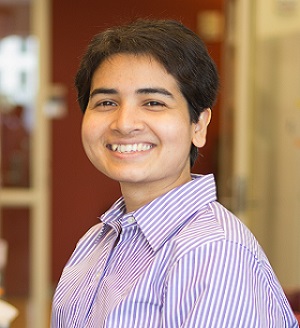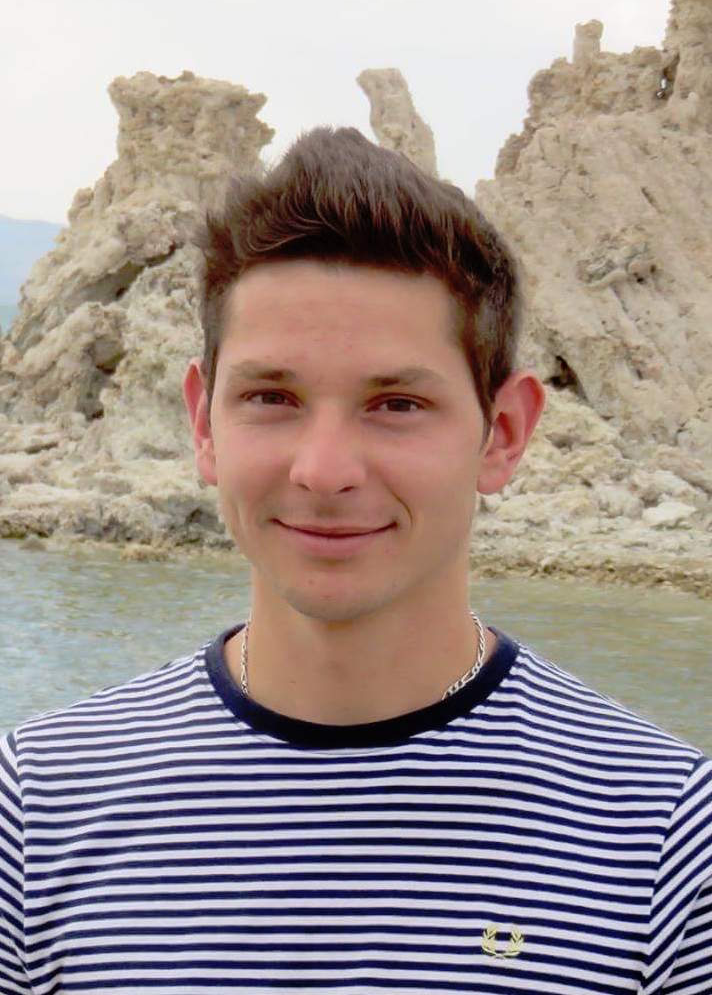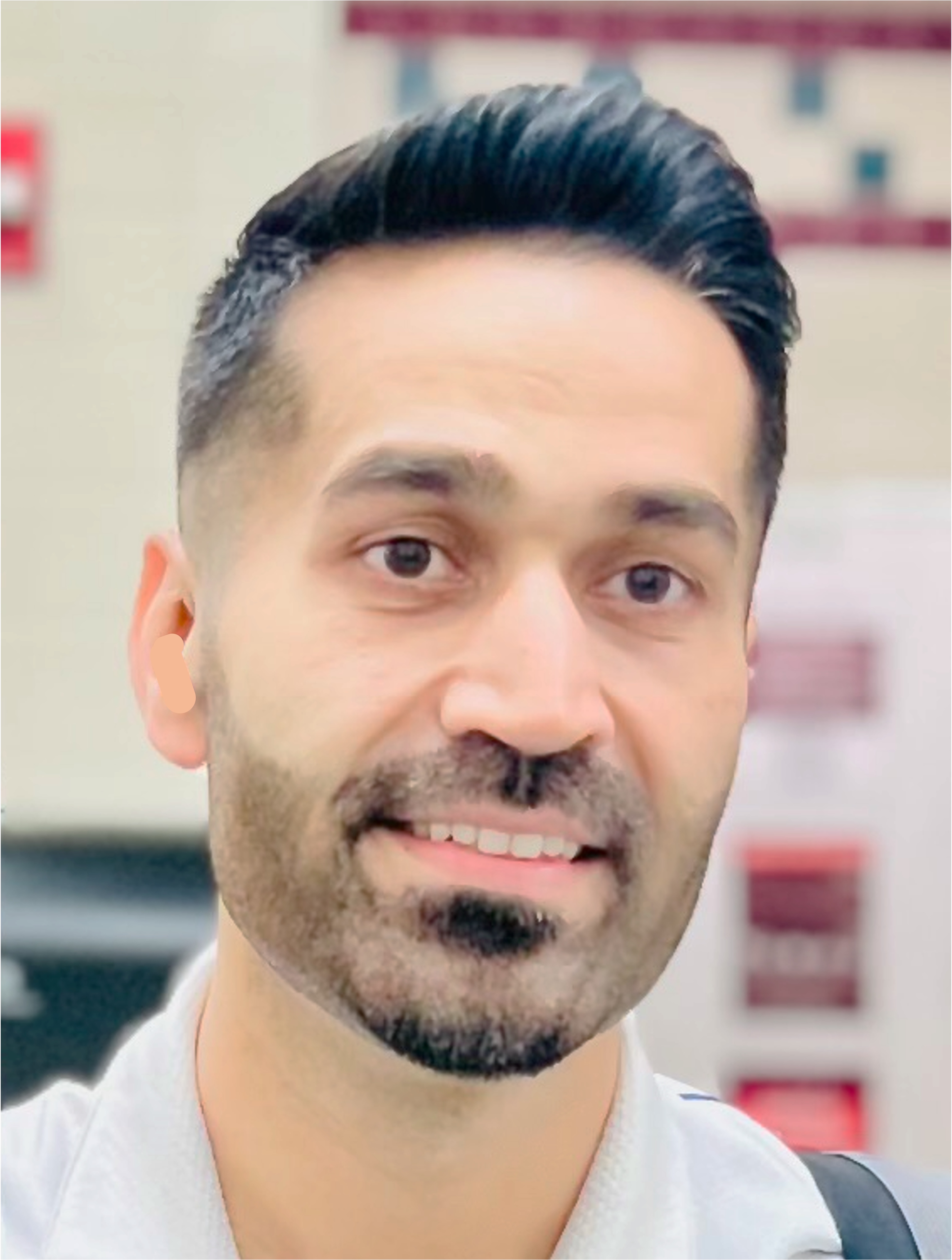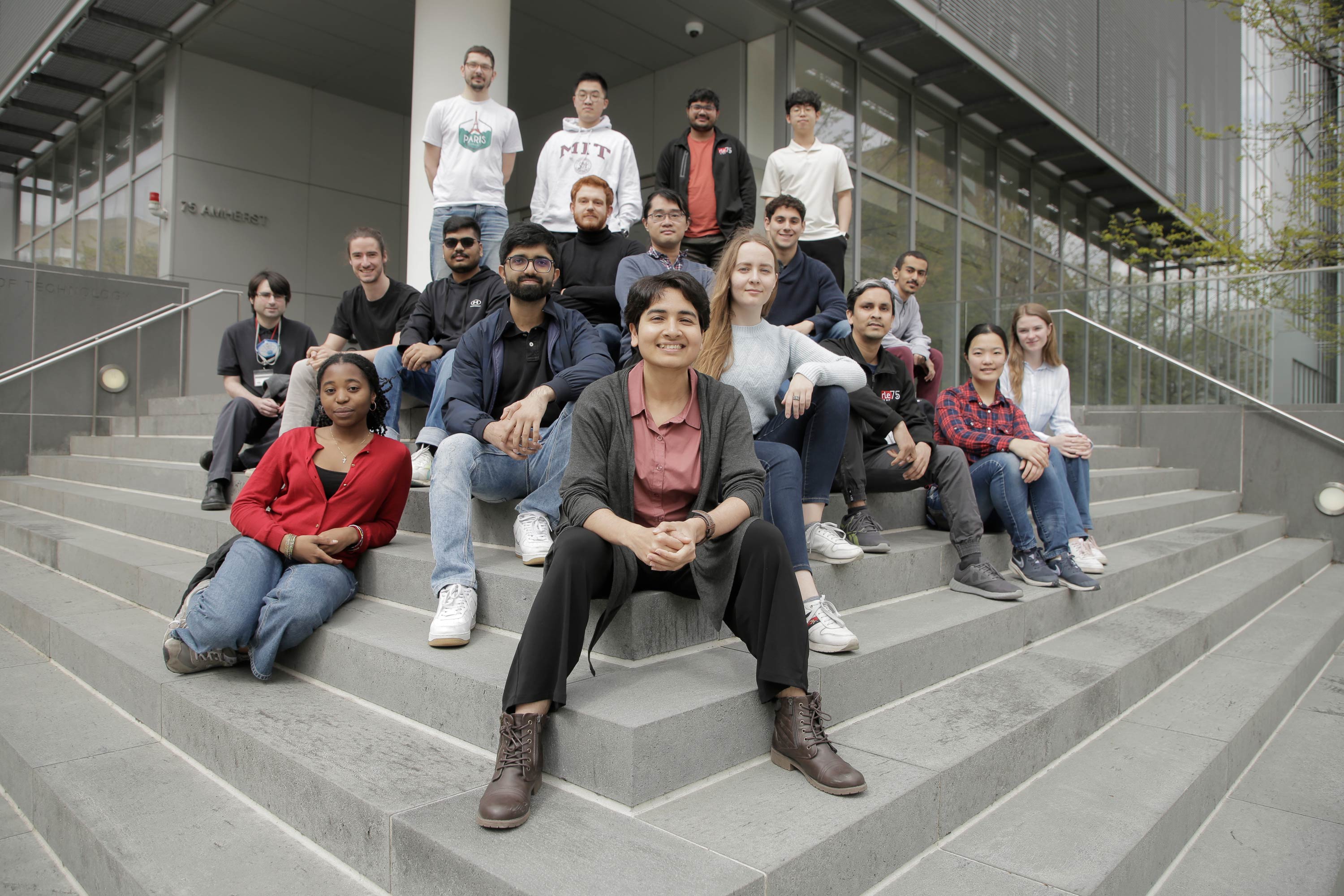
Members
Principal Investigator
Deblina Sarkar
Assistant Professor at MIT
AT&T Career Development Chair Professor at MIT Media Arts and Sciences
Founder and Director of Nano-Cybernetic Biotrek research lab
Prof. Deblina Sarkar is a trans-disciplinary innovator, initially trained in electrical engineering and physics and then, has traversed the realm of biology, driven by curiosity and belief that truly disruptive technologies can immerge at the interface of diverse research arenas. Her inventions include, among others, a 6-atom thick channel quantum-mechanical transistor overcoming fundamental power limitations, an ultra-sensitive label-free biosensor and technology for nanoscale deciphering of biological building blocks of brain. Her PhD dissertation was honored as one of the top 3 dissertations throughout USA and Canada in the field of Mathematics, Physical sciences and all departments of Engineering. She is the recipient of numerous other awards and recognitions, including the Lancaster Award, Technology Review’s one of the Top 10 Innovators Under 35 from India, NIH K99/R00 Pathway to Independence Award, IEEE Early Career Award in Nanotechnology (only awardee worldwide in 2022), Innovative Early Career Engineer by National Academy of Engineering, the NIH Director’s New Innovator Award with the highest and rarely achieved impact score, the MIND Prize, the Science News' 10 Scientists to Watch, the Distinguished Scientist Award (one of the 3 awardees nationwide), the Nanomaterials Young Investigator Award (one of the 3 awardees worldwide) and many more Continue Reading....
Assistant Professor at MIT
AT&T Career Development Chair Professor at MIT Media Arts and Sciences
Founder and Director of Nano-Cybernetic Biotrek research lab
Prof. Deblina Sarkar is a trans-disciplinary innovator, initially trained in electrical engineering and physics and then, has traversed the realm of biology, driven by curiosity and belief that truly disruptive technologies can immerge at the interface of diverse research arenas. Her inventions include, among others, a 6-atom thick channel quantum-mechanical transistor overcoming fundamental power limitations, an ultra-sensitive label-free biosensor and technology for nanoscale deciphering of biological building blocks of brain. Her PhD dissertation was honored as one of the top 3 dissertations throughout USA and Canada in the field of Mathematics, Physical sciences and all departments of Engineering. She is the recipient of numerous other awards and recognitions, including the Lancaster Award, Technology Review’s one of the Top 10 Innovators Under 35 from India, NIH K99/R00 Pathway to Independence Award, IEEE Early Career Award in Nanotechnology (only awardee worldwide in 2022), Innovative Early Career Engineer by National Academy of Engineering, the NIH Director’s New Innovator Award with the highest and rarely achieved impact score, the MIND Prize, the Science News' 10 Scientists to Watch, the Distinguished Scientist Award (one of the 3 awardees nationwide), the Nanomaterials Young Investigator Award (one of the 3 awardees worldwide) and many more Continue Reading....
Administrative Assistant

Christine Higgins
email - cwhiggs@mit.edu
Christine started her early career in facilities management where she loved crunching budget and energy management numbers for non-profit institutions such as Barnard College, American Museum of Natural History and Rockefeller University. Then she pivoted to return to her classical ballet roots, and began a 19 year journey to teach children ages 2 and up the art of classical ballet. While teaching she always kept a hand in the business side of things, by serving on the Board of Trustees and as Fundraising Chair for Riverside Boat Club. Now she is thrilled to be assisting the Nano-Cybernetic Biotrek lab with all things financial and administrative.
Post Docs
Students
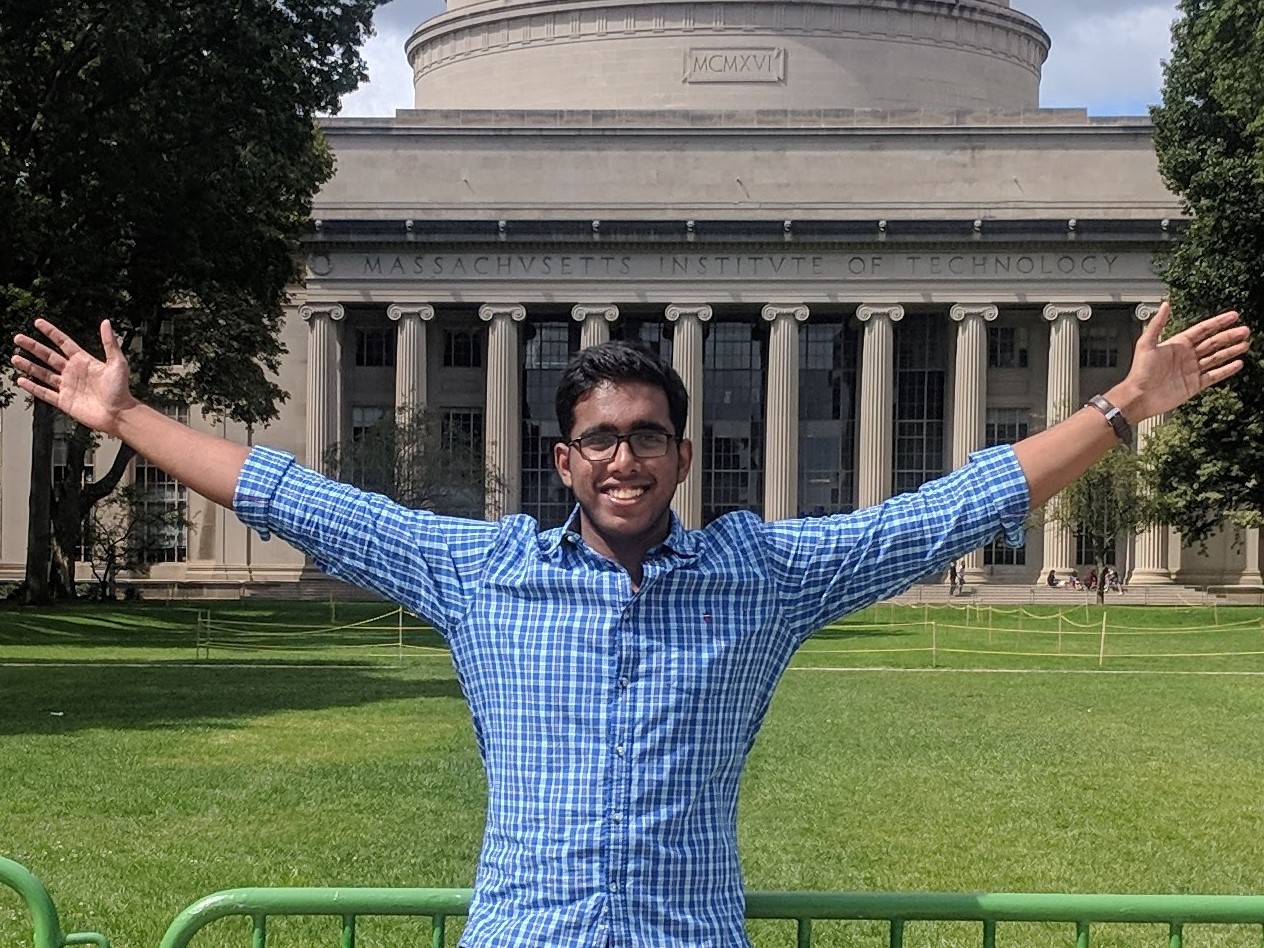
Baju Chiyezhath Joy
PhD student, Mechanical Engineering
Massachusetts Institute of Technology
Baju is currently a PhD student at MIT Media Lab. He obtained his Master’s degree in Mechanical Engineering from MIT. He completed his Bachelors in Mechanical Engineering at IIT Madras. Before joining MIT, he worked as a Research Intern in the Laboratory of Plasmon-Assisted Nanomanufacturing at Purdue University. His current research combines the fields of Nanofabrication, Electromagnetics and Neuroscience to explore novel technologies for Brain-Machine Interfacing.
PhD student, Mechanical Engineering
Massachusetts Institute of Technology
Baju is currently a PhD student at MIT Media Lab. He obtained his Master’s degree in Mechanical Engineering from MIT. He completed his Bachelors in Mechanical Engineering at IIT Madras. Before joining MIT, he worked as a Research Intern in the Laboratory of Plasmon-Assisted Nanomanufacturing at Purdue University. His current research combines the fields of Nanofabrication, Electromagnetics and Neuroscience to explore novel technologies for Brain-Machine Interfacing.

Shubham Yadav
PhD student, Media Lab
Massachusetts Institute of Technology
Shubham is currently a PhD student at MIT Media Lab. He obtained his Master’s degree in Media Arts and Sciences from MIT. Before joining MIT, he was working as a SoC Design Engineer in Intel, India. He completed his B.Tech-M.Tech (Dual Degree) in Electrical Engineering at the Indian Institute of Technology Kanpur, India. He worked on Organic Solar Cells for his research work at IITK. His current research is focussed on building fundamentally different electronic devices with the aim to achieve high energy-efficiency and ultra-scalability in nanoelectronics.
PhD student, Media Lab
Massachusetts Institute of Technology
Shubham is currently a PhD student at MIT Media Lab. He obtained his Master’s degree in Media Arts and Sciences from MIT. Before joining MIT, he was working as a SoC Design Engineer in Intel, India. He completed his B.Tech-M.Tech (Dual Degree) in Electrical Engineering at the Indian Institute of Technology Kanpur, India. He worked on Organic Solar Cells for his research work at IITK. His current research is focussed on building fundamentally different electronic devices with the aim to achieve high energy-efficiency and ultra-scalability in nanoelectronics.

Shivam Kajale
MS student, Media Lab
Massachusetts Institute of Technology
Shivam is a Master’s student at the Media Labs. He received his Bachelors and Masters (Dual Degree) in Electrical Engineering from IIT Bombay in 2020, where he worked on modelling the interactions between surface acoustic waves and ferromagnets. Previously, he has worked as a Research Intern at Purdue University, and as Software Developer Intern at Superbolter Technologies, Bangalore. His present research focuses on realising the goal of highly energy-efficient “beyond CMOS” devices, based on magnetics, spintronics and magnetoelectrics.
MS student, Media Lab
Massachusetts Institute of Technology
Shivam is a Master’s student at the Media Labs. He received his Bachelors and Masters (Dual Degree) in Electrical Engineering from IIT Bombay in 2020, where he worked on modelling the interactions between surface acoustic waves and ferromagnets. Previously, he has worked as a Research Intern at Purdue University, and as Software Developer Intern at Superbolter Technologies, Bangalore. His present research focuses on realising the goal of highly energy-efficient “beyond CMOS” devices, based on magnetics, spintronics and magnetoelectrics.

Jad Hanna
Visiting Student, Brain & Cognitive Sciences
Massachusetts Institute of Technology
Jad received his B.S. degree in Microengineering from the Swiss Federal Institute of Technology, Lausanne (EPFL) in 2020, and is studying towards an M.S. in Electrical Engineering at ETH Zürich, Switzerland. Through research stays at the Delft University of Technology and ETH, he worked on nanopore-based protein fingerprinting, and transistor-level noise characterization of biomedical frontends and IoT sensor nodes. He is currently studying computational neurosciences as a Fulbright Scholar at MIT. He joined NCB in Jan. 2022, where he works on novel nanotechnologies for wireless electrophysiology.
Visiting Student, Brain & Cognitive Sciences
Massachusetts Institute of Technology
Jad received his B.S. degree in Microengineering from the Swiss Federal Institute of Technology, Lausanne (EPFL) in 2020, and is studying towards an M.S. in Electrical Engineering at ETH Zürich, Switzerland. Through research stays at the Delft University of Technology and ETH, he worked on nanopore-based protein fingerprinting, and transistor-level noise characterization of biomedical frontends and IoT sensor nodes. He is currently studying computational neurosciences as a Fulbright Scholar at MIT. He joined NCB in Jan. 2022, where he works on novel nanotechnologies for wireless electrophysiology.

Kyuho Jang
MS student, Media Lab
Massachusetts Institute of Technology
Kyuho is a Masters's student in the Media Lab. Before joining MIT, he worked on the mechanical characterization of granular materials using optimization theory at the Multi-Variant Structures & Materials Lab at Seoul National University. He earned his Master’s and Bachelor’s degree in material science and engineering from SNU in 2022. His current research focuses on wirelessly sensing tumors in the deep brain region.
MS student, Media Lab
Massachusetts Institute of Technology
Kyuho is a Masters's student in the Media Lab. Before joining MIT, he worked on the mechanical characterization of granular materials using optimization theory at the Multi-Variant Structures & Materials Lab at Seoul National University. He earned his Master’s and Bachelor’s degree in material science and engineering from SNU in 2022. His current research focuses on wirelessly sensing tumors in the deep brain region.

Preet Patel
MS student, Media Lab
Massachusetts Institute of Technology
Preet is a Master's Student at Media Labs. He Double Majored in Electrical and Chemical Engineering along with a minor degree in Computer Science (ML Specialization) at IIT Kanpur in 2022. Before joining MIT, he worked on the active soft matter at IIT Kanpur and as a MITACS research intern in the Nanotribology Lab at the University of Calgary. He also worked on designing Battery Thermal Management Systems for EVs as an Engineering Intern at KPIT Technologies. His current research work focuses on wireless sensing modalities from Deep Brain regions.
MS student, Media Lab
Massachusetts Institute of Technology
Preet is a Master's Student at Media Labs. He Double Majored in Electrical and Chemical Engineering along with a minor degree in Computer Science (ML Specialization) at IIT Kanpur in 2022. Before joining MIT, he worked on the active soft matter at IIT Kanpur and as a MITACS research intern in the Nanotribology Lab at the University of Calgary. He also worked on designing Battery Thermal Management Systems for EVs as an Engineering Intern at KPIT Technologies. His current research work focuses on wireless sensing modalities from Deep Brain regions.

Hao-Tung Yang
MS student, Media Lab
Massachusetts Institute of Technology
Hao Tung is currently a master's student at MIT Media Lab. He obtained his Bachelor's degree in Biomedical Engineering (EE minor) from National Taiwan University. Before joining NCB, Hao Tung was working on precise neural modulation through temporal interference at the Institute of Molecular Biology, Academia Sinica. His current research work focuses on developing wireless bioelectronic devices for interfacing with the brain.
MS student, Media Lab
Massachusetts Institute of Technology
Hao Tung is currently a master's student at MIT Media Lab. He obtained his Bachelor's degree in Biomedical Engineering (EE minor) from National Taiwan University. Before joining NCB, Hao Tung was working on precise neural modulation through temporal interference at the Institute of Molecular Biology, Academia Sinica. His current research work focuses on developing wireless bioelectronic devices for interfacing with the brain.

Pengrui Zhang
Visiting Student, Media Lab
Massachusetts Institute of Technology
Pengrui is a visiting student at NCB lab at MIT. She is an undergrad from Tongji University studying microelectronics. Before joining NCB, she worked on electromagnetism, antennas, and metasurfaces. Currently, she is focused on developing bioelectronic devices, particularly for brain stimulation and wireless sensing applications.
Visiting Student, Media Lab
Massachusetts Institute of Technology
Pengrui is a visiting student at NCB lab at MIT. She is an undergrad from Tongji University studying microelectronics. Before joining NCB, she worked on electromagnetism, antennas, and metasurfaces. Currently, she is focused on developing bioelectronic devices, particularly for brain stimulation and wireless sensing applications.

Anna Y Haddad
BS student, Mechanical Engineering,
Massachusetts Institute of Technology
Anna is an undergraduate student at MIT pursuing a major in Mechanical Engineering and a minor in Biomedical Engineering. She has previous experience in medical devices, and she is excited to explore interdisciplinary research at the forefront of nanotechnology.
BS student, Mechanical Engineering,
Massachusetts Institute of Technology
Anna is an undergraduate student at MIT pursuing a major in Mechanical Engineering and a minor in Biomedical Engineering. She has previous experience in medical devices, and she is excited to explore interdisciplinary research at the forefront of nanotechnology.
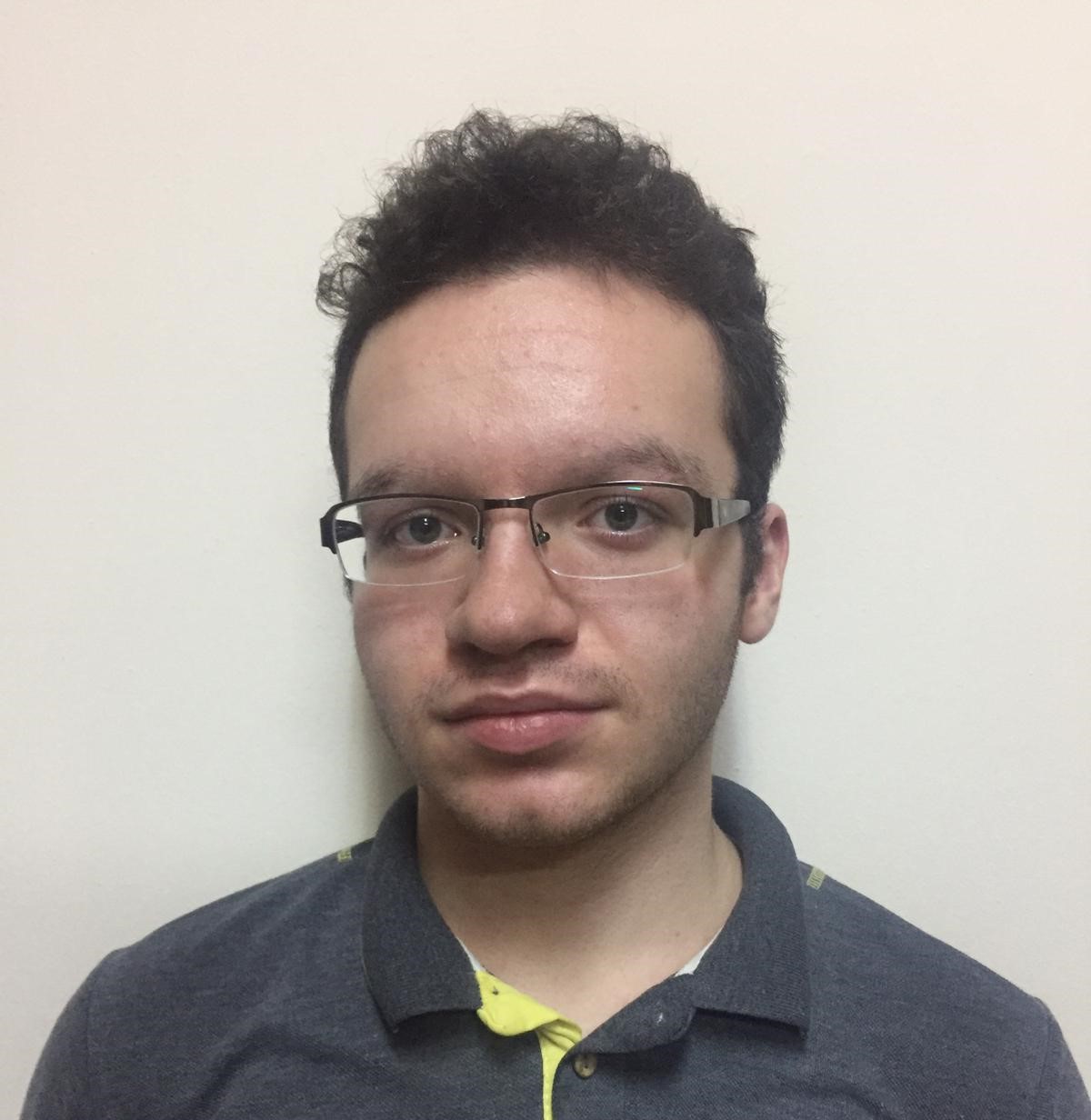
Berkin Binbas
BS student, Physics, Mathematics and Computer Science,
Massachusetts Institute of Technology
Berkin is a rising junior at MIT studying physics, math, and computer science. He is interested in physics research, and in the discovery of new ferromagnetic materials as well as understanding the physical roots of ferromagnetism better. He also wants to explore deeper quantum mechanical effects in materials, quantum computation and astrophysics.
BS student, Physics, Mathematics and Computer Science,
Massachusetts Institute of Technology
Berkin is a rising junior at MIT studying physics, math, and computer science. He is interested in physics research, and in the discovery of new ferromagnetic materials as well as understanding the physical roots of ferromagnetism better. He also wants to explore deeper quantum mechanical effects in materials, quantum computation and astrophysics.

Loey Bull
BS student, Neuroscience and Music,
Wellesley College
Loey is a senior at Wellesley College studying neuroscience and music. She has previously conducted social cognitive research at McGovern Institute. Currently, she is involved in a neuroscience mentorship program promoting research accessibility for high schoolers. Loey is particularly interested in the application of neurotechnology for the treatment and prevention of brain disorders.
BS student, Neuroscience and Music,
Wellesley College
Loey is a senior at Wellesley College studying neuroscience and music. She has previously conducted social cognitive research at McGovern Institute. Currently, she is involved in a neuroscience mentorship program promoting research accessibility for high schoolers. Loey is particularly interested in the application of neurotechnology for the treatment and prevention of brain disorders.
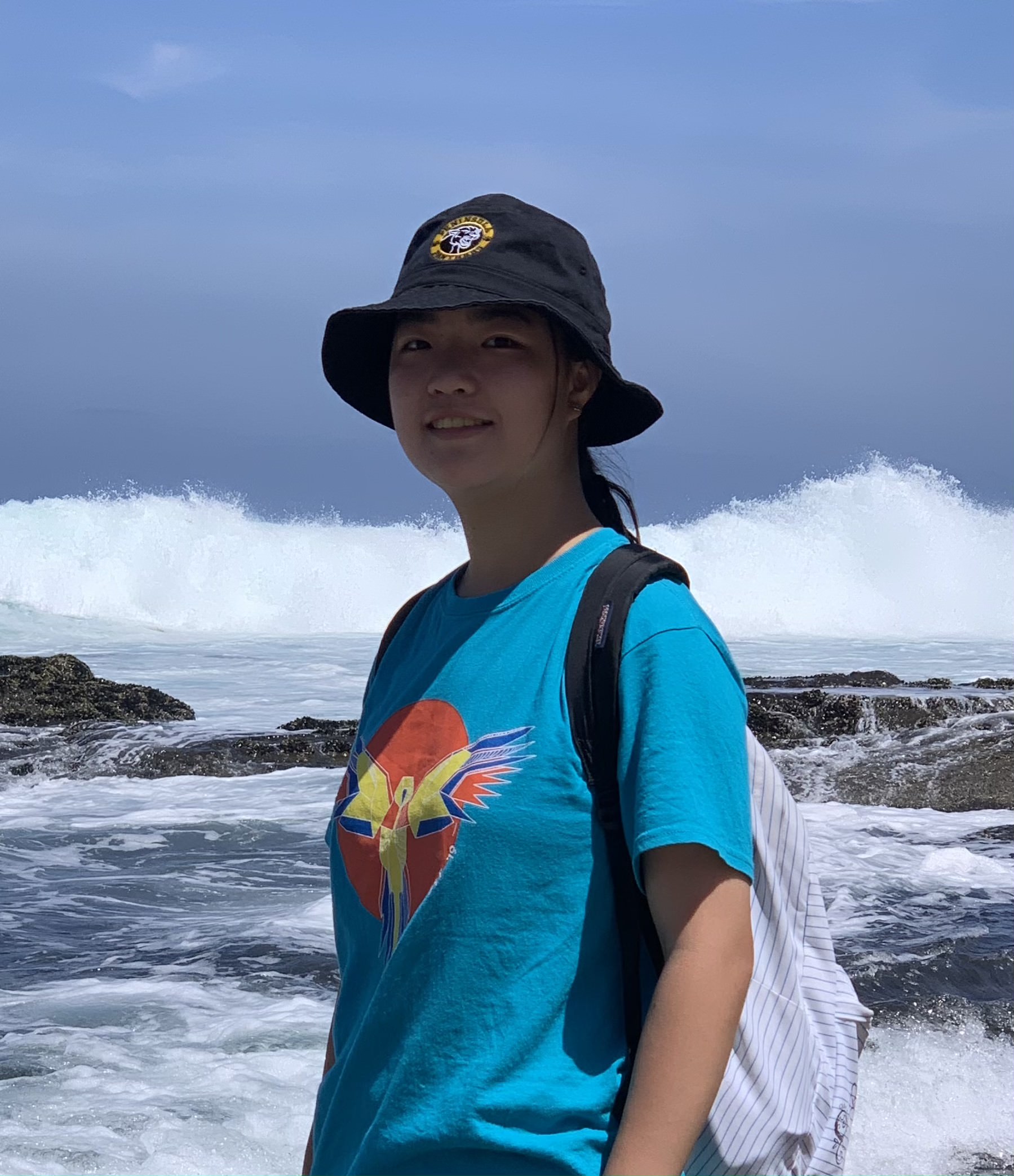
Sarah Cao
BS student, Possibly Chemical-Biological Engineering,
Massachusetts Institute of Technology
Sarah is a freshman at MIT interested in studying in fields related to biology, chemistry, computer science, and math and minoring in Music. Aspiring to learn as much as she could at Media Lab, she intends to broaden her understanding of research across disciplines and explore engineering topics she previously had not had the chance to interact with.
BS student, Possibly Chemical-Biological Engineering,
Massachusetts Institute of Technology
Sarah is a freshman at MIT interested in studying in fields related to biology, chemistry, computer science, and math and minoring in Music. Aspiring to learn as much as she could at Media Lab, she intends to broaden her understanding of research across disciplines and explore engineering topics she previously had not had the chance to interact with.

Jared Scott
BS student, Mechanical Engineering,
Massachusetts Institute of Technology
Jared is a fourth-year undergraduate student at MIT pursuing a Bachelor of Science in Engineering (Course 2-A) with a minor in Computer Science. His previous work includes research on imaging techniques for astrophysics and cancer treatment planning at the MIT Kavli Institute and the Massachusetts General Hospital, respectively. He has an avid interest in bioinspired engineering, human-computer interaction, and the development of hardware and software systems for treatment and augmentation of biological systems.
BS student, Mechanical Engineering,
Massachusetts Institute of Technology
Jared is a fourth-year undergraduate student at MIT pursuing a Bachelor of Science in Engineering (Course 2-A) with a minor in Computer Science. His previous work includes research on imaging techniques for astrophysics and cancer treatment planning at the MIT Kavli Institute and the Massachusetts General Hospital, respectively. He has an avid interest in bioinspired engineering, human-computer interaction, and the development of hardware and software systems for treatment and augmentation of biological systems.

Soo Park
BS student, Applied Physics,
Wellesley College
Soo Park is a rising senior studying applied physics. She is working in investigating nanoelectronics for brain imaging and scanning at the Sarkar Lab. She is also working at the Koch Institute for Integrative Cancer Research, researching ways to improve lung transplant outcomes under Dr. Elizabeth Calle. She hopes to pursue a graduate degree in biomedical engineering upon graduation.
BS student, Applied Physics,
Wellesley College
Soo Park is a rising senior studying applied physics. She is working in investigating nanoelectronics for brain imaging and scanning at the Sarkar Lab. She is also working at the Koch Institute for Integrative Cancer Research, researching ways to improve lung transplant outcomes under Dr. Elizabeth Calle. She hopes to pursue a graduate degree in biomedical engineering upon graduation.
Akililu Aron
BS student, Electrical Engineering and Computer Science,
Massachusetts Institute of Technology
I’m a rising sophomore studying electrical engineering and computer science. I’m interested in the applications of electrical engineering in terms of interacting with our environment, including electromagnetics physics and signals processing, as well as the electronic devices that allow us to do so and their programming.
BS student, Electrical Engineering and Computer Science,
Massachusetts Institute of Technology
I’m a rising sophomore studying electrical engineering and computer science. I’m interested in the applications of electrical engineering in terms of interacting with our environment, including electromagnetics physics and signals processing, as well as the electronic devices that allow us to do so and their programming.

Claudia
BS student, Electrical Engineering and Computer science and Neuroscience Double Major ,
Massachusetts Institute of Technology
I’m a rising sophomore double majoring in electrical engineering and computer science and Neuroscience. By combining EECS and Neuroscience I hope to work in the area of Neuroengineering. My main goal is to help understand the human brain better and use this information to help people with neurodegenerative diseases
BS student, Electrical Engineering and Computer science and Neuroscience Double Major ,
Massachusetts Institute of Technology
I’m a rising sophomore double majoring in electrical engineering and computer science and Neuroscience. By combining EECS and Neuroscience I hope to work in the area of Neuroengineering. My main goal is to help understand the human brain better and use this information to help people with neurodegenerative diseases

Magnolia
BS student, Biological Engineering and Music,
Massachusetts Institute of Technology
Magnolia is a rising senior studying Biological Engineering and Music. She has a background in neuroscience and cancer immunotherapy research and is excited now to be a part of such interdisciplinary research in the realm of bioelectronic interfaces. Ultimately, post-MIT, Magnolia hopes to wield research as a way not only to impact the scientific world but to also promote public health.
BS student, Biological Engineering and Music,
Massachusetts Institute of Technology
Magnolia is a rising senior studying Biological Engineering and Music. She has a background in neuroscience and cancer immunotherapy research and is excited now to be a part of such interdisciplinary research in the realm of bioelectronic interfaces. Ultimately, post-MIT, Magnolia hopes to wield research as a way not only to impact the scientific world but to also promote public health.

Sophie Guo
BS student, Biological Engineering,
Massachusetts Institute of Technology
Sophie Guo is currently a third-year undergraduate student at MIT, pursuing a major in Biological Engineering and a minor in Computer Science. In the past, she has worked on various projects that have focused on the intersection of nanotechnology towards ultra-sensitive biological detection applications, therefore leading her to her interests in Dr. Sarkar’s work. At MIT, she is also a NEET scholar, participating in the Living Machines track, an interdisciplinary program which focuses on applying engineering principles and concepts to the problems of life and medical sciences through various biotechnology innovations.
BS student, Biological Engineering,
Massachusetts Institute of Technology
Sophie Guo is currently a third-year undergraduate student at MIT, pursuing a major in Biological Engineering and a minor in Computer Science. In the past, she has worked on various projects that have focused on the intersection of nanotechnology towards ultra-sensitive biological detection applications, therefore leading her to her interests in Dr. Sarkar’s work. At MIT, she is also a NEET scholar, participating in the Living Machines track, an interdisciplinary program which focuses on applying engineering principles and concepts to the problems of life and medical sciences through various biotechnology innovations.

Tiffany
BS student, Physics and Maths,
Wellesley College
Tiffany is currently a sophomore student from Wellesley College, double-majoring in physics and math. She is particularly interested in areas of condensed matter and wants to explore deeper in the field of quantum mechanics and its potential in computation.
BS student, Physics and Maths,
Wellesley College
Tiffany is currently a sophomore student from Wellesley College, double-majoring in physics and math. She is particularly interested in areas of condensed matter and wants to explore deeper in the field of quantum mechanics and its potential in computation.
Seung Hyeon Shim
BS student, Biological Engineering,
Massachusetts Institute of Technology
Seung Hyeon is a class of 2023 at MIT majoring in Biological Engineering with a minor in Chemistry. Previously, she worked at McGovern Institute, investigating Autism Spectrum Disorder (ASD), and now, she works with Dr. Deblina Sarkar in the Media Lab focusing on Python-based neuron stimulation and nano-implantable devices. Drawn to the world of innovative biotechnology and the spirit of medical altruism, Seung Hyeon aspires to become a trauma surgeon and make lasting impacts by reaching out to thousands of people in the developing countries.
BS student, Biological Engineering,
Massachusetts Institute of Technology
Seung Hyeon is a class of 2023 at MIT majoring in Biological Engineering with a minor in Chemistry. Previously, she worked at McGovern Institute, investigating Autism Spectrum Disorder (ASD), and now, she works with Dr. Deblina Sarkar in the Media Lab focusing on Python-based neuron stimulation and nano-implantable devices. Drawn to the world of innovative biotechnology and the spirit of medical altruism, Seung Hyeon aspires to become a trauma surgeon and make lasting impacts by reaching out to thousands of people in the developing countries.
